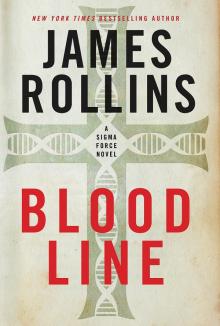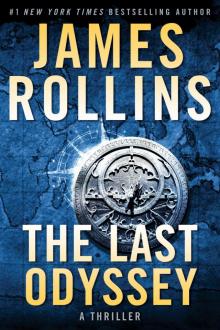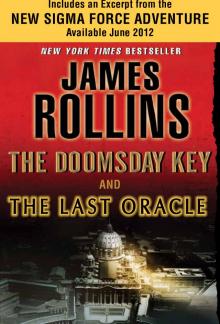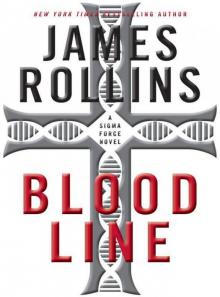- Home
- James Rollins
Bloodline: A Sigma Force Novel Page 19
Bloodline: A Sigma Force Novel Read online
Page 19
With the satellite phone on speaker, he stepped again to the large window that overlooked the city and beachfront. Far out, near the horizon, a glow shone against the midnight sea, like the reflection of the moon. But it wasn’t a reflection or the moon, but another celestial body.
Gray fogged the glass with his breath and drew on the window with his finger.
A five-pointed star.
“The new island of Utopia out there is in the shape of a starfish.” Gray faced the others, as Painter listened on the line. “The boy back in Somalia said that Amanda was being taken to heaven. Maybe he misinterpreted utopia, translating the name as best he could as a heavenly place. Or maybe he heard the destination of the kidnappers was shaped like a star, a piece of the heavens.”
“Or maybe you’re grasping at straws,” Kowalski said.
Seichan stood with her arms crossed, similarly unimpressed.
Gray remembered their brief intimate moment in the bathroom. In that fleeting instance, the worries of family and mission responsibilities faded. He existed in the simple purity of touch and possibility. With his mind cleared, the nagging puzzle stuck in his head broke through the muddle of his awareness. The answer burst forth fully formed, shining with the certainty of truth.
But maybe he was the only one convinced.
Even Painter put a noncommittal spin on his revelation. “It’s something I can look into. Maybe by morning—”
“We can’t wait until morning. Amanda could be moved again or harmed. We need to take advantage of the hours of darkness left to us.”
“You’re talking about putting a lot of resources to bear on a hunch,” Painter argued. “You could burn your cover, expose the fact that you know Amanda’s still alive, all for nothing.”
“I know I’m right,” Gray said.
“How can you be so sure?” Seichan said.
Gray returned to the window. “Because of the breakwater around Utopia, the same as can be seen out the window surrounding the palm islands.”
He fogged the glass again with a hard breath and filled in the rest of his map of Utopia, drawing in a crescent breakwater around the starfish-shaped island.
“A moon and a star,” Gray said, poking at the symbols.
A gasp rose from Seichan.
Kowalski swore.
Tucker shrugged. “I don’t get it.”
Gray glanced at him, remembering the man knew nothing about the Guild. “It’s the root symbol for a shadowy organization, one that’s committed acts of terrorism around the world. The director already suspected this group might be behind Amanda’s kidnapping.”
“Now you tell me,” Kowalski grumbled. “If I’d known that, I would’ve sat this one out.”
Tucker still shook his head. “The crescent and the moon. You can find that emblem on most Arab national flags. The Emirates is an Islamic country. The design of the islands might simply be representing that Muslim symbol.”
Painter agreed. “He’s right, Gray. But you’ve convinced me enough that the island is worth investigating. I’ve ordered a team to assemble an intelligence brief on the place. I already pulled a picture off the Web, photos showing the towers under construction on the main island. Impressive. Several are already occupied by businesses, with the remainder of the spaces nailed down by corporations from around the world. From what I’m seeing, security is tight around that island.”
“That’s why I wanted to head out there tonight. Go in dark.”
“No good.” It sounded like Painter was reading from a report. “They’ve got a radar-monitoring system that circles the entire island. They’ll know you’re approaching from a mile away.”
“Then we can get as close as we can and use scuba gear to—”
“I may have a better way,” Painter said, letting out a long sigh. “There’s someone in the area I can reach out to. His name came up during the initial intelligence sweep of Dubai. A deep-sea salvage operator. He’s got a pair of submersibles, possibly something we can use to ferry your team to Utopia. He’s been doing survey and engineering work on the seabed for an underwater hotel being constructed offshore.”
“Hydropolis,” Gray said, remembering the latest addition to the Dubai waterfront.
“That’s right.”
From the sound of the director’s voice, Painter was still not too keen on involving a third party, especially this person.
“Director, if you don’t trust this guy …”
“It’s not that. He can be trusted. He’s performed many high-security clearance projects for the government, even for the military.”
“Then what’s the matter?”
Again that heavy sigh. “He’s Lisa’s ex-boyfriend.”
Kowalski turned away, mumbling under his breath, “Oh, that’s not going to be awkward.”
20
July 2, 4:34 P.M. EST
Charleston, South Carolina
“And Jack’s agreed to help?” Lisa asked.
She stood by the open balcony door on the second floor of Harbourview inn, a historic building in the heart of downtown Charleston that overlooked the river and a waterfront park.
“He did,” Painter said. “Even agreed to keep this midnight mission a secret from the rest of the crew of the Deep Fathom. He’ll be taking the sub out personally.”
She closed the French doors, returning inside to the air-conditioned luxury. Her room was appointed with a four-poster bed and period pieces, and featured an exposed redbrick wall and working fireplace, a richness of accommodation to help bolster her cover.
She hadn’t thought about Jack Kirkland in some time. She had been fresh out of UCLA medical school, working under a National Science Foundation grant to study the physiological effects of deep-sea work on the human body. Jack had been the captain of an eighty-foot salvage ship, the Deep Fathom, manned by a team of scientists and treasure hunters. The two had a brief, fiery relationship that burned out as fast as it started. It was all physical, but not from lack of trying—lots of trying, multiple times a day. She smiled at the memory. Though almost a decade had passed, it felt like a lifetime ago.
What happened to that bikini-clad, bronze-legged girl?
A pang of melancholia swept through her.
Painter redirected her to the present, stoking the worries that had died down by the distraction of his call. “And Kat’s still not back?”
“No.” She checked her watch. It was almost five o’clock. She’d been back at the hotel for over two hours and expected Kat to join up with her shortly thereafter. They weren’t supposed to communicate with each other until reunited at the hotel, to keep their distance from each other.
“And you’ve not heard anything from her?” she asked.
“Not a word, but when you called an hour ago, I pinged her recording devices. The pen camera in the reception area is still operational, but offered no clue to her whereabouts. The other devices in her possession were never activated. And the remote hacking device you planted continues to transmit data. So far they’ve not found it, and we’ve been gathering reams of data.”
“Anything about Amanda?”
“I got the profiles you e-mailed, but we’ve hit a wall when searching for Amanda’s medical file—a firewall. I have a skilled engineer trying to sap a way under that digital barrier, but it’s delicate work to keep from raising alarm bells. Still, if Kat had been caught, I doubt our surveillance devices would still be operational. They’d sweep the place clean.”
“So then where is she?”
“I don’t know. The clinic doctors could be running tests, or maybe she got nabbed by in-house security for trespassing and it’s taking extra time to talk her way out. Or maybe it’s as simple as traffic. She does have to take the bus back to the city.”
Lisa let his words calm her. Due to construction delays, it had taken her an hour to wind her way across town to reach the hotel. And Kat would have to change buses twice to get here.
Maybe Painter’s right …
<
br /> Still, she couldn’t escape the feeling that something was wrong.
“Wasn’t the original plan to rendezvous at the hotel at six o’clock?” Painter asked.
“That’s true. But why hasn’t she at least reported in to you if she’d left the clinic?”
Painter’s reply took too long. “I don’t know,” he finally admitted. “We’ll keep monitoring what we can. We’ll give Kat until six o’clock to break silence before we make a move.”
Lisa knew that would be an agonizingly long hour for her.
Painter spoke in her ear—not talking to her this time, but to somebody who must have stepped into his office. Though he lowered the receiver away from his face, she still heard his voice sharpen. “Send me everything,” he ordered, then returned to Lisa. “Kat activated a second pen camera. Technicians are downloading the camera’s SD card and sending the contents to my computer.”
A knock on the door drew her attention. “Someone’s at the door,” she said.
In her ear, Lisa heard a commotion over the phone—then Painter swore brightly. “Lisa, don’t answer it! Get out of there!”
Wood splintered as someone kicked the door.
Panic spiked. She twisted away.
Another kick sounded behind her.
The door crashed open.
4:46 P.M.
Kat let her hand drop away, accidentally dragging her purse off a metal table beside her gurney. The contents spilled across the floor, but she was too weak to stop it from happening. It had taken all her effort to lift her arm and groggily reach into her bag, fumble for one of the surveillance pens, and press its disguised clip to activate the camera inside.
No video would be recorded inside her purse, but audio would still be picked up. The same could be said for Kat in her current drugged state. Her vision remained a blurry pinpoint; her stomach churned queasily. But she could hear well enough to know someone came running into the small room, drawn by the clatter of her upended bag.
“Looks like she was going for her cell phone.”
A shadowy shape dropped next to her bed and began scooping up the contents of her purse, shoving them back inside. It sounded like the orderly from earlier.
The next voice supported that supposition. Judging by the frosty New England accent, it had to be Dr. Marshall, the woman who cattle-prodded Kat into convulsing submission. “Roy, I thought you said she’d be out for another ten to fifteen minutes.”
“From the dosage, her body weight, she should’ve been. I just stepped out to grab a fresh gown before stripping her for the intake exam.”
“Didn’t I warn you she was fit, robust. She’s not like the usual malnourished, strung-out subjects that land here. You should have anticipated that, Roy. She might have injured herself.”
“Sorry. It won’t happen again.”
Judging by the gist of the conversation, they remained unaware of Kat’s true identity, blind to her connection to sigma. But where was she? Her head lolled around, trying to get some bearing as to her location. She innately sensed that not much time had passed. All she could tell was that they’d moved her to another room, likely within the same facility. The space looked sterile. Too many bright surfaces pained her eyes, and the air definitely had the antiseptic smell of a hospital.
Painter’s instinct had been correct about the fertility clinic. Something was wrong here. But what? Why had they drugged and kidnapped her?
“I’m not ready for her exam yet,” Dr. Marshall said. “So you might as well take her to her cell.”
Cell?
“Let her shake off the rest of the sedative,” the doctor finished. “She’ll be easier to work with if she’s not as limp as a rag doll. Besides, the sooner she learns to behave the better.”
Dr. Marshall still held her cattle prod, tapping it against the gurney, emphasizing who was the boss.
The orderly, Roy, hauled Kat onto the gurney and drew her out of the room and down a poorly lit corridor. Though there were no windows, she sensed she was underground, in a basement level.
Roy stepped to a locked door and used a key card hanging from a lanyard around his neck to open a set of swinging doors. Stepping to the head of the stretcher, he wheeled her through and into a large circular ward, painted a soothing light blue with tables scattered around and a television playing silently in the background. A set of double doors lay directly opposite, painted a warning shade of red. Likely it was locked as securely as the doors into the ward.
The orderly swung her gurney to the side. She noted the living space had bookshelves, a showering facility, and, all along the periphery, small rooms—cells—a dozen in all, each sealed by metal-framed glass doors.
A single woman stood framed in one of the doorways, behind glass, dressed in a blue smock, her hair shorn to a crew cut, her face expressing fear and sorrow. She placed a palm against her glass door, either as a sign of solidarity or to warn her off.
But there was nothing Kat could do.
At least not yet.
She leaned her head to the side and studied the red steel doors, only now noting the raised symbol spanning that exit. It was a cross, adorned with stylized representations of helical DNA. She sensed that whatever secrets were hidden at this clinic, the answers lay beyond that threshold.
But right now she had another door to worry about.
Roy reached a vacant cell—there seemed to be many—and used a master key to unlock the door and haul it open. Next, he shouldered Kat up into his arms. Dr. Marshall’s descriptive use of the term rag doll was appropriate. She couldn’t keep her feet under her; her arms felt cast in cement.
The orderly hauled her to the unmade cot in the room and tossed her on top of it. “Stay out of trouble this time.”
Kat had enough strength to watch him leave. As he shoved the door shut and wheeled away the stretcher, she spotted her purse atop the gurney. She pictured the surveillance device inside.
Dear God, let someone be listening.
5:02 P.M.
Washington, DC
“We’re still not picking up any audio or video,” a technician reported.
Another analyst called from across the room. “I’ve got security feed from Harbourview coming up over here.”
Painter pointed to the tech. “Keep monitoring all of Kat’s surveillance devices.” He stepped toward the analyst. “Show me that feed from Lisa’s hotel.”
Painter crossed sigma’s communications nest, moving the eye of a hurricane with him. He had other intelligence analysts and agents laboring across the banks of computers and monitors that formed a semicircle across the back of the room. To his left, an adjoining windowed office looked into the space.
It was Kat’s command center, her nest within the nest. A single monitor glowed in that dark space, illuminating the young face of her chief analyst, Jason Carter, who hunched over a keyboard working on a separate project.
Out here, chaos reigned as Painter sought answers to the fate of Kat and Lisa. He kept one ear fixed on the flow of information in the room while his left hand held a Bluetooth earpiece in place, awaiting any more audio from Kat’s surveillance device. A pair of wall monitors displayed the video from the two pens she planted. One showed the reception area of the North Charleston Fertility Clinic. The other was dark, receiving no video.
Painter had heard the initial conversation that was downloaded after the second pen was activated. It sounded like someone had drugged and kidnapped Kat and was now holding her prisoner.
But after that, nothing.
The feed had fallen unnervingly silent for the past twelve minutes.
At the moment, he didn’t know if Kat was still at the fertility clinic or taken somewhere else. They tried to track her disposable cell phone but ended up hitting a blank wall. Either reception was being blocked, or her phone’s battery had been stripped out.
He was ready to contact the Charleston law enforcement, have them storm the clinic, but to what end? Kat might not be there, and i
f she was, her captors would likely kill her before warrants could be issued. Such an effort would also lay bare sigma’s continuing investigation into Amanda and the Gant family.
That must not happen.
His mind raced through countless stratagems, while his heart pounded in his throat, fueled by yet another fear, another unknown.
Where are you, Lisa?
When he received Kat’s transmission, he’d been on the phone with his girlfriend. When he recognized that Kat was in trouble, his anxiety shifted immediately to encompass Lisa—especially when, seconds later, an analyst burst into his office to inform him that the hack into the clinic’s computers had suddenly got severed.
He got a brief warning out to Lisa—then heard the crash of a door in the background and the line went dead.
“I’ve got the hotel feed now.” The agent pointed to a monitor in front of him. A stuttering image flickered, silent, showing three assailants in a hallway, all wearing ski masks.
So they knew about the cameras.
One knocked on the door, shook his head, then another stepped back and kicked the door in. The three rushed inside, vanishing out of view. Without a camera inside the hotel room, there was no telling for sure what transpired after that.
As he watched, Painter found himself holding his breath. He had to force himself to breathe. Panic would not serve either Lisa or Kat.
After Lisa’s phone went dead, he had immediately called hotel security and reported the break-in. The head of security called back within five minutes. It had been the longest five minutes of his life.
When he finally heard back, he was relieved with the report but far from settled: We chased the intruders off, but the hotel room was empty. We found a purse and a cell phone and luggage. No occupant.
Painter watched the same scenario play out again on the screen. A two-man security detail came racing down the hall, but the three assailants dashed out, one shooting at the approaching guards, forcing them back. The three then took off, disappearing down a stairwell.
A neighboring analyst swung around in his chair. “Director, I have Harbourview security again.”

 The Skeleton Key
The Skeleton Key The Last Oracle
The Last Oracle The Judas Strain
The Judas Strain Black Order
Black Order Sandstorm
Sandstorm Ghost Ship
Ghost Ship The Devil Colony
The Devil Colony Subterranean
Subterranean The Doomsday Key
The Doomsday Key The 6th Extinction
The 6th Extinction Bloodline
Bloodline Jake Ransom and the Howling Sphinx
Jake Ransom and the Howling Sphinx The Midnight Watch
The Midnight Watch Map of Bones
Map of Bones The Demon Crown
The Demon Crown Deep Fathom
Deep Fathom Sigma Guide
Sigma Guide Kowalski's in Love
Kowalski's in Love Jake Ransom and the Skull King's Shadow
Jake Ransom and the Skull King's Shadow Excavation
Excavation The Seventh Plague
The Seventh Plague Altar of Eden
Altar of Eden Unrestricted Access: New and Classic Short Fiction
Unrestricted Access: New and Classic Short Fiction Indiana Jones and the Kingdom of the Crystal Skull
Indiana Jones and the Kingdom of the Crystal Skull Crucible
Crucible The Eye of God
The Eye of God The Bone Labyrinth
The Bone Labyrinth The Last Odyssey: A Thriller
The Last Odyssey: A Thriller Unrestricted Access
Unrestricted Access Amazonia
Amazonia Blood Brothers: A Short Story Exclusive
Blood Brothers: A Short Story Exclusive Map of Bones: A Sigma Force Novel
Map of Bones: A Sigma Force Novel The Skeleton Key (sigma force)
The Skeleton Key (sigma force) Sigma Force 10 - The Sixth Extinction
Sigma Force 10 - The Sixth Extinction Innocent Blood
Innocent Blood Map of Bones sf-2
Map of Bones sf-2 The Eye of God: A Sigma Force Novel
The Eye of God: A Sigma Force Novel The Eye of God: A Sigma Force Novel sf-9
The Eye of God: A Sigma Force Novel sf-9 The Pit
The Pit Indiana Jones and the The Kingdom Of The Crystal Skull
Indiana Jones and the The Kingdom Of The Crystal Skull The Last Oracle (2008) sf-5
The Last Oracle (2008) sf-5 City of Screams
City of Screams The Doomsday Key and The Last Oracle with Bonus Excerpts
The Doomsday Key and The Last Oracle with Bonus Excerpts The Judas Strain sf-4
The Judas Strain sf-4 Blood Infernal
Blood Infernal The Demon Crown: A Sigma Force Novel
The Demon Crown: A Sigma Force Novel War Hawk: A Tucker Wayne Novel
War Hawk: A Tucker Wayne Novel SANDSTORM sf-1
SANDSTORM sf-1 Bloodline: A Sigma Force Novel
Bloodline: A Sigma Force Novel Amazonia: a novel
Amazonia: a novel The Last Oracle: A Sigma Force Novel
The Last Oracle: A Sigma Force Novel City of Screams (the order of the sanguines)
City of Screams (the order of the sanguines) Ghost Ship: A Sigma Force Short Story
Ghost Ship: A Sigma Force Short Story The Doomsday Key: A Sigma Force Novel
The Doomsday Key: A Sigma Force Novel